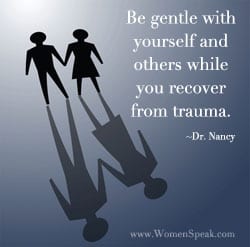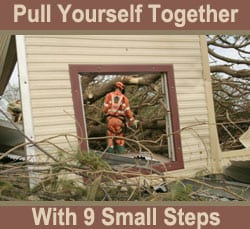 By Dr. Nancy O’Reilly, Psy.D.
By Dr. Nancy O’Reilly, Psy.D.
After a natural disaster like a hurricane or earthquake, victims and responders alike struggle to meet basic needs and wonder day-by-day what’s going to happen.
People are worried about their loved ones and are wondering from afar what they can do to help. Please reach out and communicate as much as you can with friends, neighbors and loved ones who are struggling. Just being able to tell their story is going to help them, so try to be a good listener, even if you have heard the story several times before. Re-telling will help them process the trauma instead of internalizing it.
These are some of the questions I have heard about what you can do to help those affected by the storm. I also offer some ideas from my experience as a licensed psychologist.
Q. I’m panicking. I still can’t reach my family who live in the area affected by a hurricane.
A. It’s natural to be worried, but don’t panic. Just because you can’t reach them doesn’t mean your loved ones are in danger. Large numbers of people are moving around to different shelters, there’s still a lot of confusion, and cell phone networks are struggling. Reach out to the people you know in the area and learn all you can about the situation. We’ve learned so much from other disasters. Go online to the American Red Cross website. They are setting up ways families can communicate and for getting people registered where they are. For the future – have all family members get the Red Cross app for their phones to let people know they are safe.
Q. This is making me so upset. The devastation and those poor people! How can I calm myself?
A. Take a deep breath and realize there’s only so much you can do. If you’re glued to the TV, you should probably stop watching more than once a day. I continue to be absorbed and as I watch it devastates me. Our emotions don’t know the difference between what we see and what we actually experience. You can actually become traumatized watching the same story over and over, especially because you’ll see the worst of the worst. In this country we show amazing fortitude and resilience and people from many other states are responding, including mental health services at every shelter location. Take a deep breath and use your best stress-management skills such as prayer, mediation, yoga and exercise. This is a long-term situation and we’ll need to help the survivors for a long time.
Q. My kids are frightened by what they see. How can I help calm them down?
 A. The most important thing is for them to know you are there for them. Their comfort is all about your ability to stay calm and execute a plan of action. They want you to take charge and say, “This is what we’re going to be doing.” Limit their TV and news time so they’re not continually watching and listening. Children especially can’t distinguish between what’s concrete and actually happening to them and what they’re seeing on TV. Find ways to let them help you maintain the family routine, and they will love it if you can do things together. Kids like things to be predictable and they’ll be comforted by what is familiar and normal. Find ways for them to run and play and have fun. You, too. You can only worry so much in a day, so it’s not disrespectful to do whatever will make you feel better. Make sure they eat well, sleep, and exercise. Notice that when kids play, it’s great exercise. When you take care of your self you are teaching your kids to take care of themselves, too.
A. The most important thing is for them to know you are there for them. Their comfort is all about your ability to stay calm and execute a plan of action. They want you to take charge and say, “This is what we’re going to be doing.” Limit their TV and news time so they’re not continually watching and listening. Children especially can’t distinguish between what’s concrete and actually happening to them and what they’re seeing on TV. Find ways to let them help you maintain the family routine, and they will love it if you can do things together. Kids like things to be predictable and they’ll be comforted by what is familiar and normal. Find ways for them to run and play and have fun. You, too. You can only worry so much in a day, so it’s not disrespectful to do whatever will make you feel better. Make sure they eat well, sleep, and exercise. Notice that when kids play, it’s great exercise. When you take care of your self you are teaching your kids to take care of themselves, too.
Q. My sister is in a shelter that is so disorganized. I’m so angry, I can’t believe they can they keep doors open!
A. Your sister is under a lot of stress. You and she both need to focus on the fact that this is a temporary situation. Even though the shelter may not be wonderful, it’s a place where she is safe and secure and can get a hot meal. Encourage her to reach out to others in the shelter to tell her story and listen to their stories. If she thinks she has a better idea for organizing some function, every shelter has a director in charge. These people are fluid and flexible and they’ll be open to something that will help the other residents there. If she talks in a friendly manner with the staff, she may find they may have reasons and plans she is not aware of. Every shelter has mental health professionals and she should seek them out and tell them her concerns. As time passes, she will have access to other services to help her relocate and help her rebuild a new normal life.
Q. I’m so mad at my husband over what has happened. I told him he needed to prepare and he didn’t. How can I get past this anger?
A. Unfortunately, procrastination leads to regret for many people. Despite every warning, we think it will never happen to us. Talk about this situation with him and express your emotions without attacking him. You may also regret that you did not take more initiative. Everyone in your family is just as upset as you are and it is important to pull together. Realize that yesterday is gone and today is all you have to work with.
Use today to create something positive for your family, so make a fresh start. If you and your husband can work together as a team you can provide the cohesiveness your family needs and you can all move forward.
Q. I’m numb. Both my parents died in a hurricane and I couldn’t save them. I feel so guilty — all I do is cry. I just don’t care about anything right now, even my kids.
 A. I am so sorry about your devastating loss. Please accept my condolences. It sounds like you are depressed, and for good reason. Loss is overwhelming, and the first stage is shock and disbelief. “This can’t be happening.” If you are in a shelter, each one has mental health professionals. Please seek them out and tell them how you are feeling. It’s important to talk about what has happened and express your emotions, even if it means you need to cry a lot. Don’t isolate yourself even though you might want to. Please get good professional help to get you through this difficult time.
A. I am so sorry about your devastating loss. Please accept my condolences. It sounds like you are depressed, and for good reason. Loss is overwhelming, and the first stage is shock and disbelief. “This can’t be happening.” If you are in a shelter, each one has mental health professionals. Please seek them out and tell them how you are feeling. It’s important to talk about what has happened and express your emotions, even if it means you need to cry a lot. Don’t isolate yourself even though you might want to. Please get good professional help to get you through this difficult time.
Q. I don’t live in the area affected by the hurricane, but now I’m afraid we could be next. What should I do?
A. Nearly every area is subject to some type of weather emergency, so it’s important to listen to your local officials. Make your plan for the disasters that might strike your area. Consider arrangements for both people and pets. Would you need to evacuate? Where will you go? Talk it over with family, friends and local emergency officials and get your plan in mind.
What supplies would you need to gather together? Check with your local emergency preparedness office for a list of supplies. Don’t wait – do it today. Think about what you would need to keep life and health going: five gallons of water; a few days of medications; medical records for all family members; important legal documents, policies and titles; and contact information. You will not able to take everything with you, so think hard about which things you love and care about. People often grieve most for loss of their family photos and mementos. You might want to scan favorites and keep a disk in your emergency box.
If you do need to evacuate, use a battery operated radio to stay up on what’s going on. And if you are leaving be sure people know where you will be and that you are safe. Don’t make them worry about you, too.
